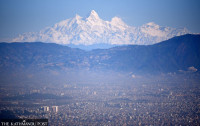Climate & Environment
Arrest of poachers inside Bardiya park cause for concern for wildlife conservation sector
Protected areas of the country witnessed a high number of illegal activities during the lockdown, but the latest incident in Bardiya suggests that poachers are still on the prowl.
Chandan Kumar Mandal
The recent arrest of two poachers with improvised firearms and weapons from the core area of Bardiya National Park has once again alarmed conservation authorities about illegal activities inside protected areas.
There were rising concerns about potential incidents of wildlife poaching and illegal logging across the country during Covid-19 lockdown.
Even after the lockdown is over, illegal activities inside protected areas and adjoining forests have not stopped, the latest incident being in Bardiya National Park.
In one of the biggest busts of this year, security forces and park officials nabbed two poachers with firearms and other weapons from Giththe Khola area, around 20 km northwest from the park headquarters at Thakurdwara, on Saturday evening.
According to Ashim Thapa, a park spokesperson, the poachers opened fire when they were confronted by the patrol team.
“The team could not ascertain how many they were because they started firing almost immediately,” said Thapa. “The incident site lies deep inside the protected area, 6 km northwest of Khayarbhatti Post.”
The patrol team seized three country-made guns, 17 bullets, 200 gm of gunpowder, five sickles, net, knives, catapults, mobile phones and torch lights. The team also recovered bags, blankets, jackets, utensils and nearly 70 kg of dried meat of wild animals from the area.
The park officials suspect that the poachers were planning to stay inside the park for a long time.
Two of the poachers, Chakra Bahadur Bista and Ganesh Tiwari of Barahatal Rural Municipality of Surkhet, were captured while the others managed to flee the scene. The park has formed a team under ranger Harsha Bahadur Singh to investigate the case.
“The incident is a reminder that controlling wildlife poaching inside protected areas is still challenging,” said Thapa.
A similar incident was reported in Parsa National Park in March, days after the country went into the lockdown. The exchange of gunfire between Nepal Army soldiers and poachers left one poacher dead. A soldier was also seriously injured in the incident.
The country’s protected areas, mainly in southern plains, including Bardiya National Park, witnessed a significant rise in illegal activities during the four months long lockdown.
Hundreds of people faced actions after they were caught engaged in prohibited activities like fishing, logging and trespassing inside protected areas with weapons.
“The rate of such activities might have come down lately, but the park still faces several challenges when it comes to protecting the wildlife. It is tough patrolling the park territory that falls in the Chure area due to difficult terrain,” said Thapa. “It can take a whole day to cover just two-three kilometres distance. The latest clash with poachers also happened in the Chure side where we had heard reports about killing of a Sambar deer and gunfire sounds.”
Following the reports, the park authority had launched several sweeping operations inside the park, including the vulnerable Chure range.
According to Thapa, there have not been serious incidents of poaching of big wild animals lately, except for the death of a tiger after falling into a trap apparently set up by hunters to trap game animals.
The park officials discovered the decomposed tiger carcass in September, indicating that poachers were active in and around the protected area.
Thapa said while they have not come across serious wildlife poaching incidents inside the park of late, incidents where people enter the park to collect firewood, fodder and to fish in the river are continuing till this day.
Conservationists say the country’s wildlife sector came under threat while the country was under lockdown, when the state apparatuses were more focused on handling the Covid-19 pandemic. There were not only incidents of illegal logging and killing of wild animals, as earlier warned by the wildlife conservationists, but the country also lost four valuable one-horned rhinos to poaching.
Chitwan National Park witnessed the killing of a one-horned rhino after 1,249 days of zero-poaching.
According to Ananath Baral, the chief conservation officer of the park, the patrol team recovered two guns that might have been used by poachers.
“Except for the killing of rhinos, there have not been any other serious poaching incidents. People living in buffer zone areas enter the park for their livelihood and such incidents will continue. These incidents cannot be seen from the point of view of crime,” said Baral. “But poaching can also take place any time, and we have to be alert. We have increased our security and monitoring mechanisms to prevent wildlife poaching.”




 20.12°C Kathmandu
20.12°C Kathmandu











